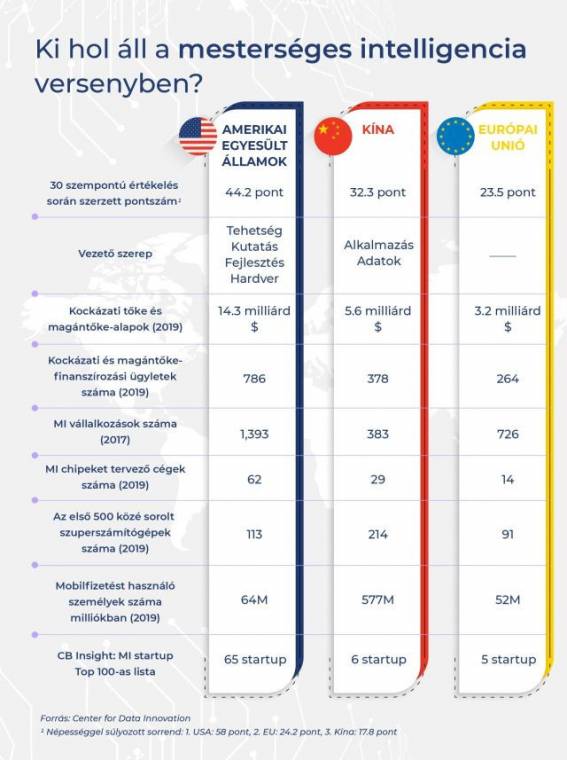The development of intelligent technologies in Hungary is gaining new impetus
By 2021, more than 30 countries have established national artificial intelligence strategies. The development of intelligent technologies is gaining new momentum at the Budapest University of Technology and Economics (BME), which is at the forefront of artificial intelligence research. In addition to the MI research of the Thematic Program of Excellence, the research teams of the National Laboratory of Artificial Intelligence have started work.
In a few years, artificial intelligence (MI) has exploded, with few industrial sectors not to take. benefit from state-of-the-art technology. The application of MI will also radically transform the development dynamics of many industries and the related labor market needs, with governments supporting businesses by promoting artificial investment in intelligence, setting up educational programs and encouraging research and development.

Budapest University of Technology and Economics (BME) is linked to the national MI strategy in a number of ways, has won governmental and EU-themed projects, and participates in excellence programs. Artificial intelligence-focused thematic research is also underway, from which a total of more than HUF 1.1 billion worth of cooperation has been generated with their large corporate partners. They have worked with companies such as Nokia, Ericsson, Vodafone, Morgan Stanley, MOL, Knorr-Bremse, Bosch, Siemens, or just Continental in recent years. For example, they have worked with Knorr-Bremse to develop an MI solution that monitors potential emergencies by monitoring the track and its surroundings and prevents accidents with early braking. Researchers and students are working with Nokia to develop 5G and soon 6G.
Building on this institutional background, the National Artificial Intelligence Laboratory, established with significant government support, and the University of Applied Sciences research groups. “We work on MI research along a unified university strategy. Six of the eight BME faculties participate in the work of the MI National Laboratory. The experts of the Technical University are active in almost all research and application areas involved in MI, we deal with machine vision, language technology, health applications, sensors, For the time being, about a small proportion of MI patents filed in the EU can be attributed to Hungary, although there is significant potential in Hungary, I am convinced that we could easily take the lead in mathematically based, algorithmically oriented research, for example, said János Levendovszky, Deputy Rector for Science and Innovation of the Budapest University of Technology and Economics (BME) and Coordinator of Artificial Intelligence Research at the University of Technology, added: MI National Laboratory, social, economic and environmental utilization of research results, knowledge transfer between research and industry. concentrates in line with the MI National Strategy, which has existed since last year, and which set targets for 2030 to advance domestic MI research. The National Artificial Intelligence Laboratory was established in 2020 as a consortium of several leading scientific and higher education institutions. BME is also a member of the consortium and its leader is the Computer Science and Automation Research Institute of the Eötvös Loránd Research Network.

In the MI innovation competition, in terms of research funding, background base, equipment, human resources, The United States is in the lead, followed by China and then the European Union, according to a comparative study published in January 2021. It is estimated that in 2019, the U.S. provided $ 14.3 billion, China $ 5.6 billion, and the European Union $ 3.2 billion in venture and private equity funding to MI businesses. While China is catching up with the United States at the speed of light, the Union is also significantly encouraging relevant research and has spent € 1.5 billion on R&D in recent years, a 70% increase over the previous period. According to CB Insight MI’s ranking of startups, 65 out of the top 100 startups can be linked to the US, with 8 companies based in the UK, 8 in Canada, 6 in China, 3 in Israel, and 5 companies registered in the EU. The EU aims to encourage a total investment of more than € 20 billion a year in the decade. The European Commission has offered more than € 4 billion under the Digital Europe program to support high-performance and quantum computing. Under InvestEU, it intends to increase access to finance for MI startups by building on a € 100 million pilot investment fund.
Among the National Laboratories established in 2020, BME also participates in the work of three research communities , which carry out research for the development of smart technologies. In addition to Artificial Intelligence, the University of Technology also participates in the tasks of the National Laboratory of Quantum Informatics and the National Laboratory of Autonomous Systems
Hardware, software, tests, curiosities and colorful news from the world of IT by clicking here
The practical application of the National Artificial Intelligence Laboratory can be learned in detail from the program.
The post The development of intelligent technologies in Hungary is gaining new impetus appeared first on World Weekly News.
